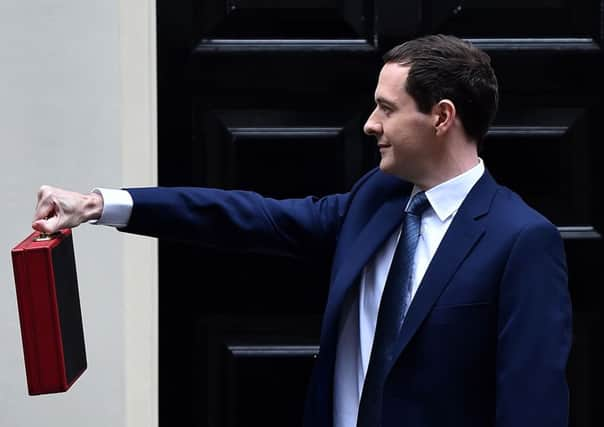Leaders: A Budget with its fair share of smoke and mirrors


From next April, employers will have to pay staff at least £7.20 an hour, an increase of 70p from the current minimum wage. The living wage will rise to £9 an hour by 2020, theoretically making a real difference to the lives of the very worst-off – just in time for the next General Election.
But while Mr Osborne may appear to have shown some largesse, things aren’t quite so straightforward. Those who gain from the new living wage will lose through a freeze on working-age benefits.
Advertisement
Hide AdAdvertisement
Hide AdThe Chancellor also creates unwelcome confusion over the minimum wage and the living wage, which are two different measures. The minimum wage is mandatory, as is the wage that Mr Osborne unveiled yesterday. The living wage is voluntary and is calculated according to the basic cost of living. As a result, there is a gap between the two: the minimum wage is currently £6.50 per hour and the living wage is £7.85.
Mr Osborne is raising the minimum wage, but at the same time labelling it the living wage – and falling 65p short of where that measure currently stands. It’s a neat trick, and slickly redefining the term “living wage” might just confuse enough people to make the policy look generous.
When examined in its entirety, the Budget offers little comfort to those most in need. Benefit payments will be frozen for four years, employment support allowance will be cut, and young people aged 18-21 – often vulnerable and unsupported – will lose access to housing benefit.
Unsurprisingly, there was much in Mr Osborne’s statement to appeal to the Tory Party’s traditional supporters: an increase in the inheritance tax threshold to £1 million for married couples by 2017; a reduction in corporation tax to 18 per cent by 2020; and a freeze on fuel duties for the remainder of this year.
There is, of course, majority support both north and south of the Border for a cap on benefits. Scots are as “small c conservative” on the matter as the English, and Mr Osborne’s decision to further limit the amount a family might claim will, we expect, play well with voters who resent the notion that some get “something for nothing”.
But behind that populist spin is the reality that those who receive most in benefits are often struggling with serious illness and other complex problems.
Responding to the Budget, SNP deputy leader Stewart Hosie said it would hit the “poorest and most vulnerable”. While opposition parties are virtually duty-bound to criticise a Chancellor, many observers will fear Mr Hosie is correct.
An entirely necessary campaign
THAT such a campaign is deemed necessary is deeply depressing, but necessary it most certainly is.
Advertisement
Hide AdAdvertisement
Hide AdPolice Scotland yesterday unveiled a new plan to tackle rape and other sex crimes. An advertisement – aimed at young men – shows a man trying to undress a woman against her will after they kiss. As the short film unfolds, the message “sex without consent is rape” appears.
Some will say this hardly needs to be pointed out but the fact so many young men commit the terrible crime of rape suggests otherwise. Education – even the statement of the obvious – is a key part of the attempt to reduce offending.
Young people may be familiar with the mechanics of sex from an early age but there is more to coming of age than that, and anything which asks boys and young men to think more about what represents consent must be encouraged.
A new generation is growing up with access to extreme and often violent pornography which can distort perceptions of sexual relationships. The existence of such material is no excuse for those who carry out attacks but it is something which necessitates a response.
Rape is a life-changing crime, from which some victims may never fully recover. During 2014-15, Police Scotland recorded 1,797 rapes, an increase of 5.3 per cent on the previous year, while last year, Rape Crisis reported a 35 per cent increase in the number of victims going on to report to the police, but still the crime is under-reported.
If this campaign can make potential perpetrators consider their behaviour and encourage victims to speak up, then it will have been entirely worthwhile.